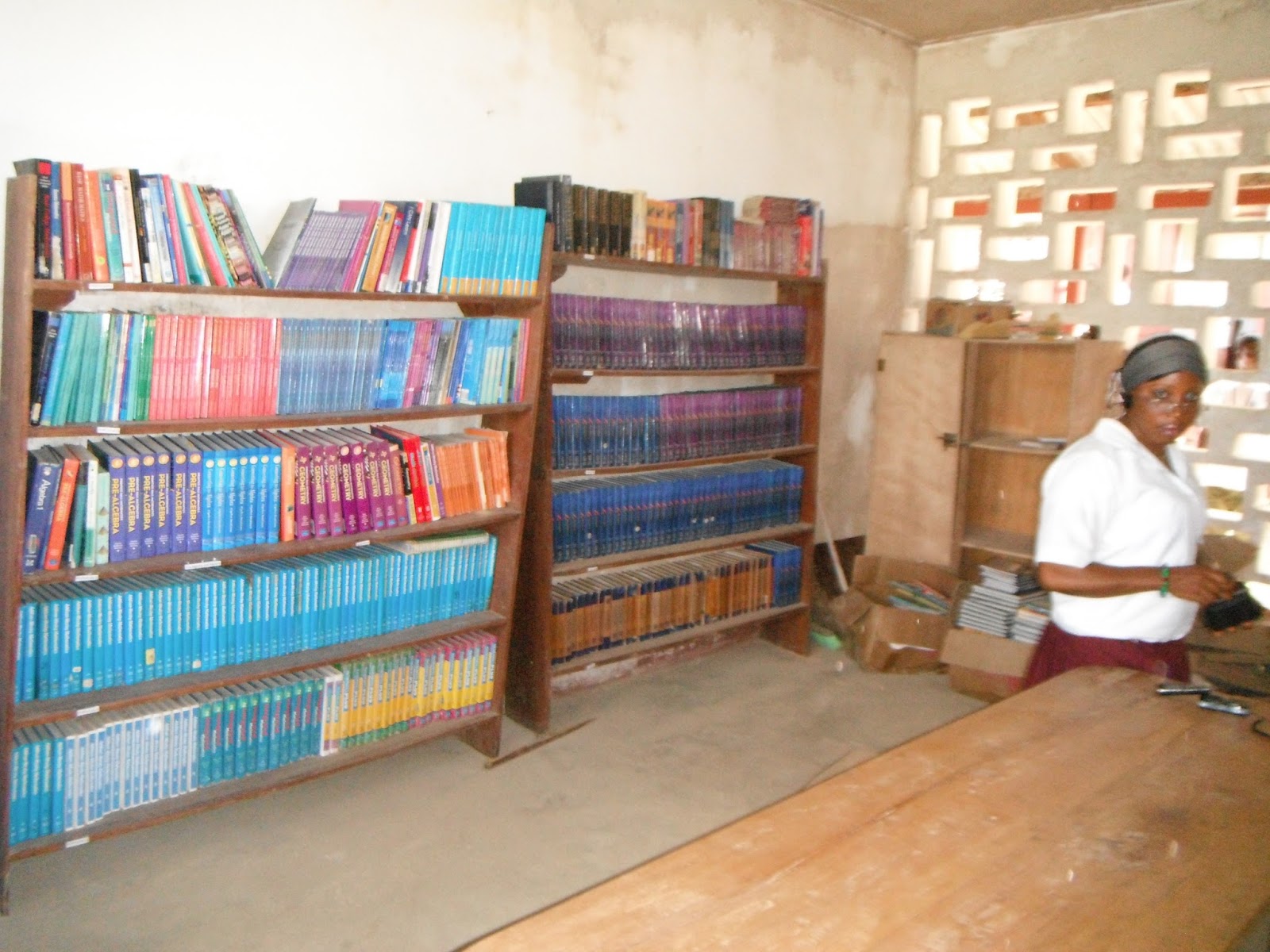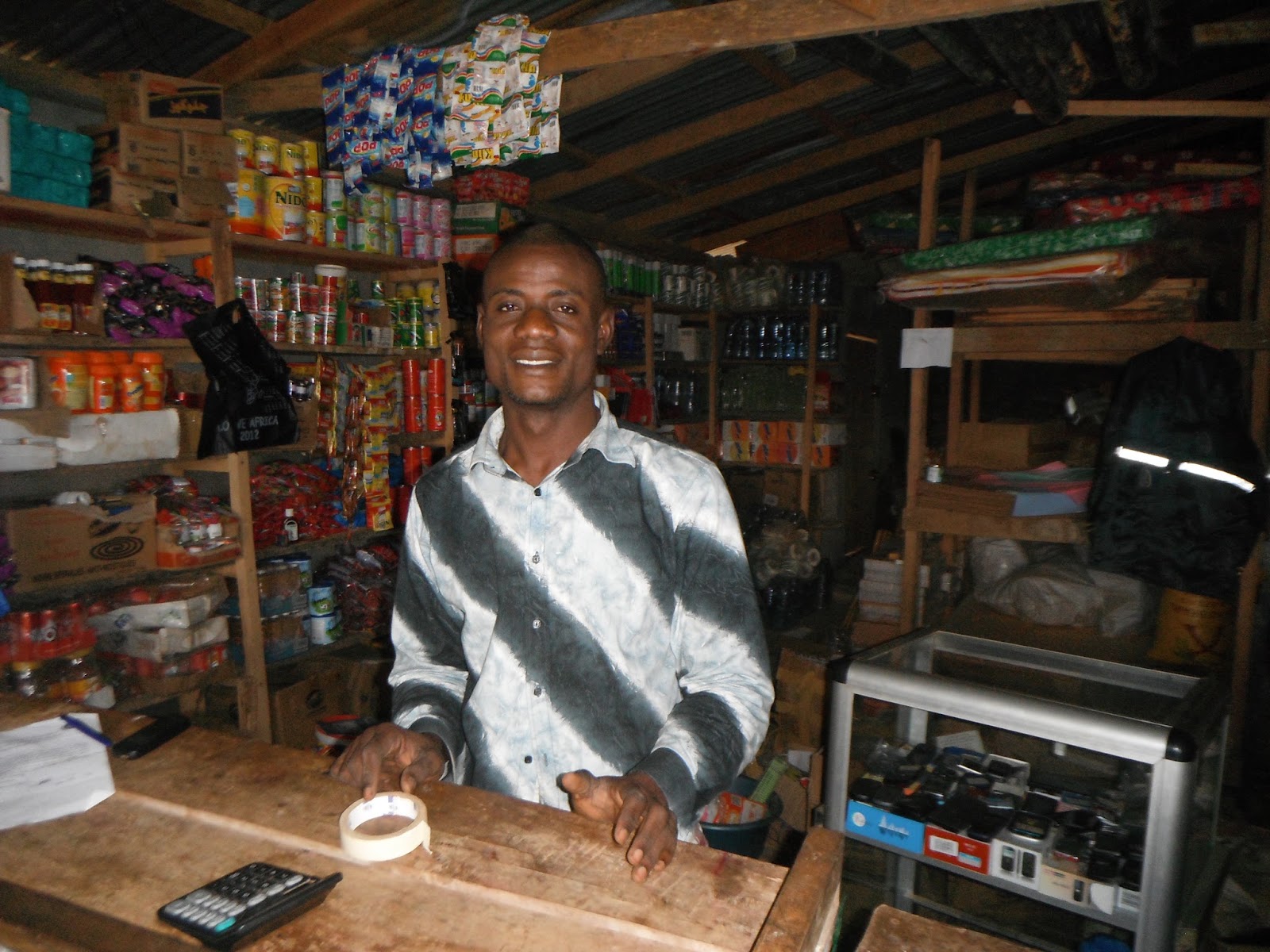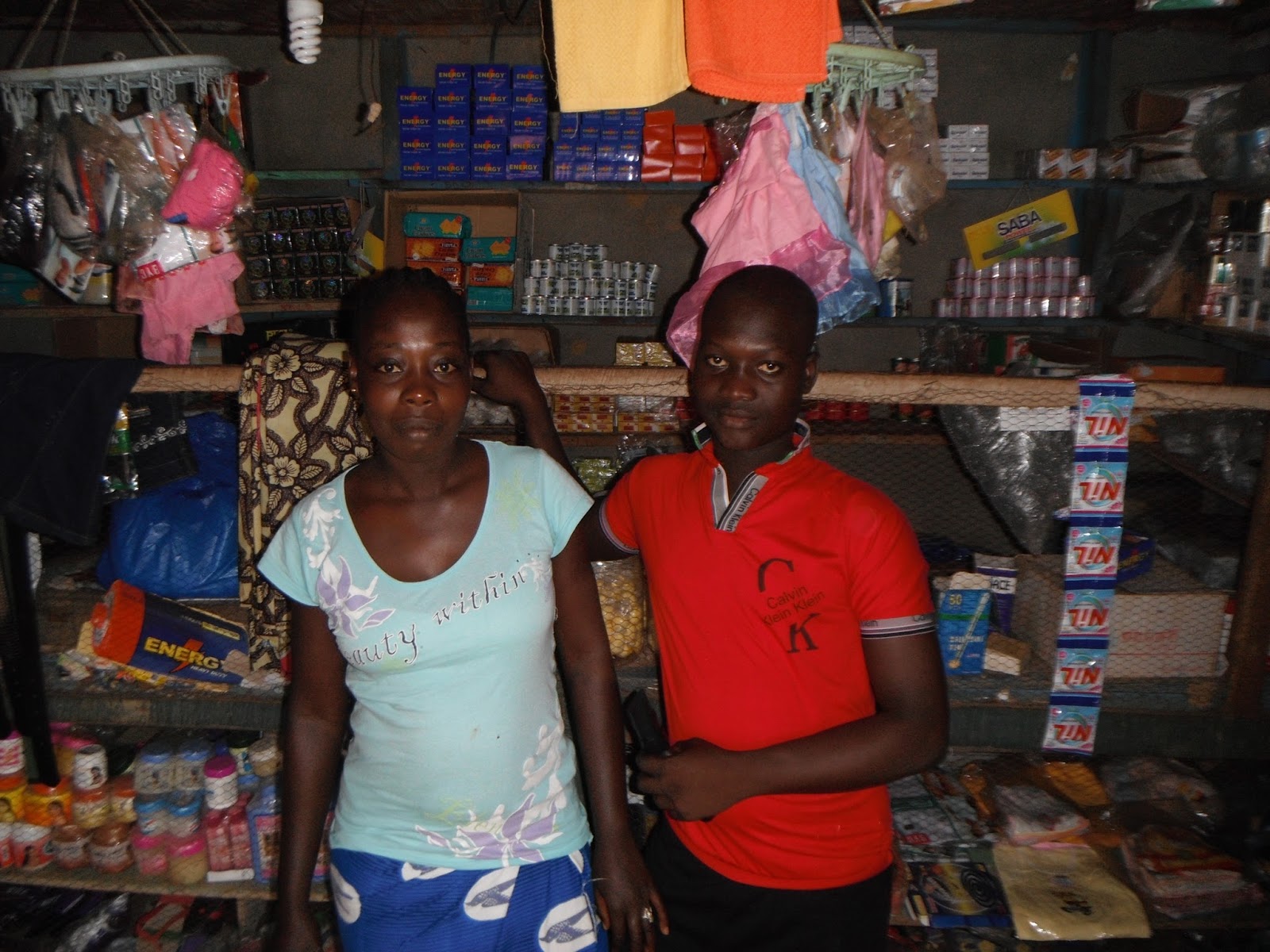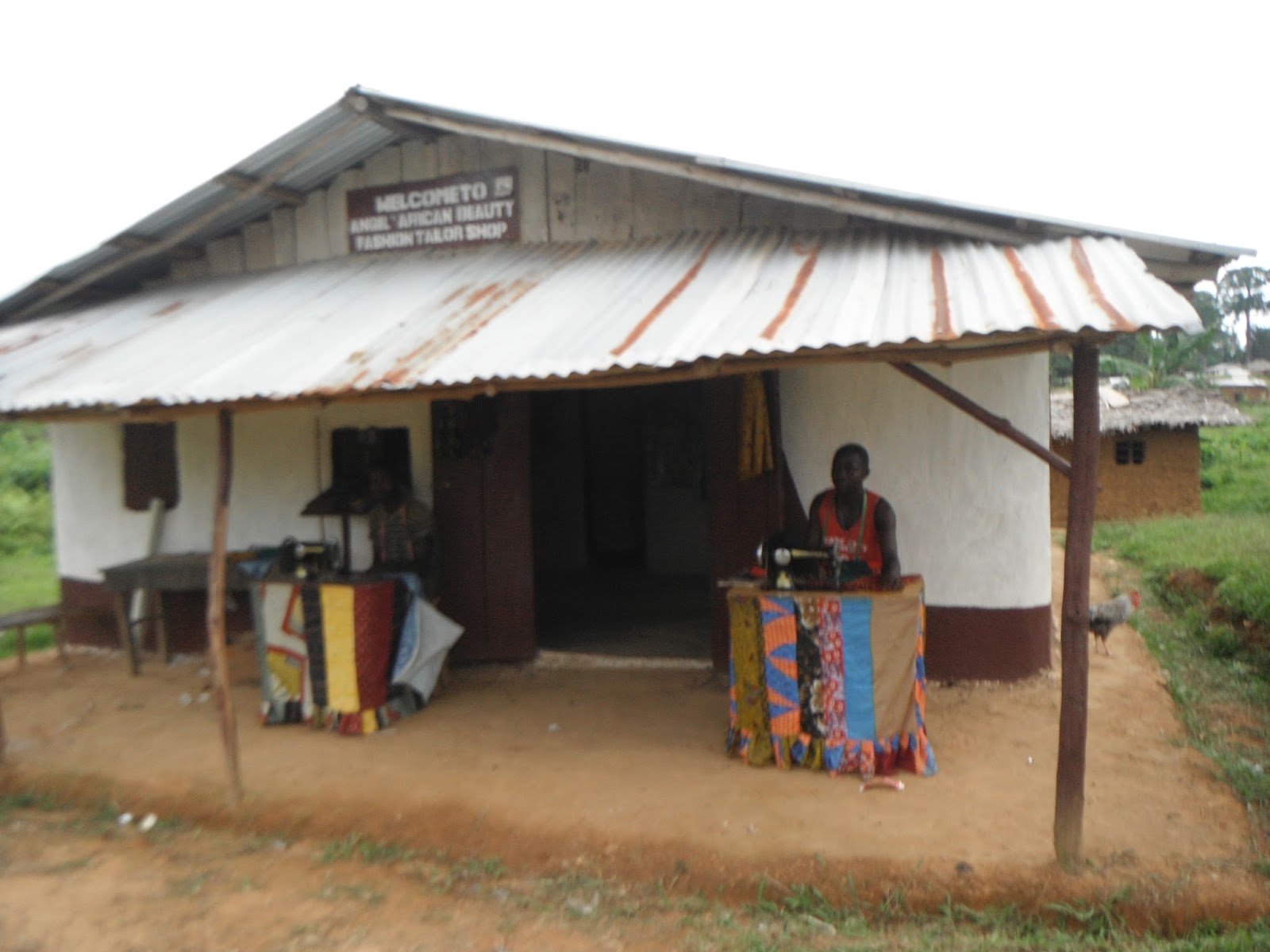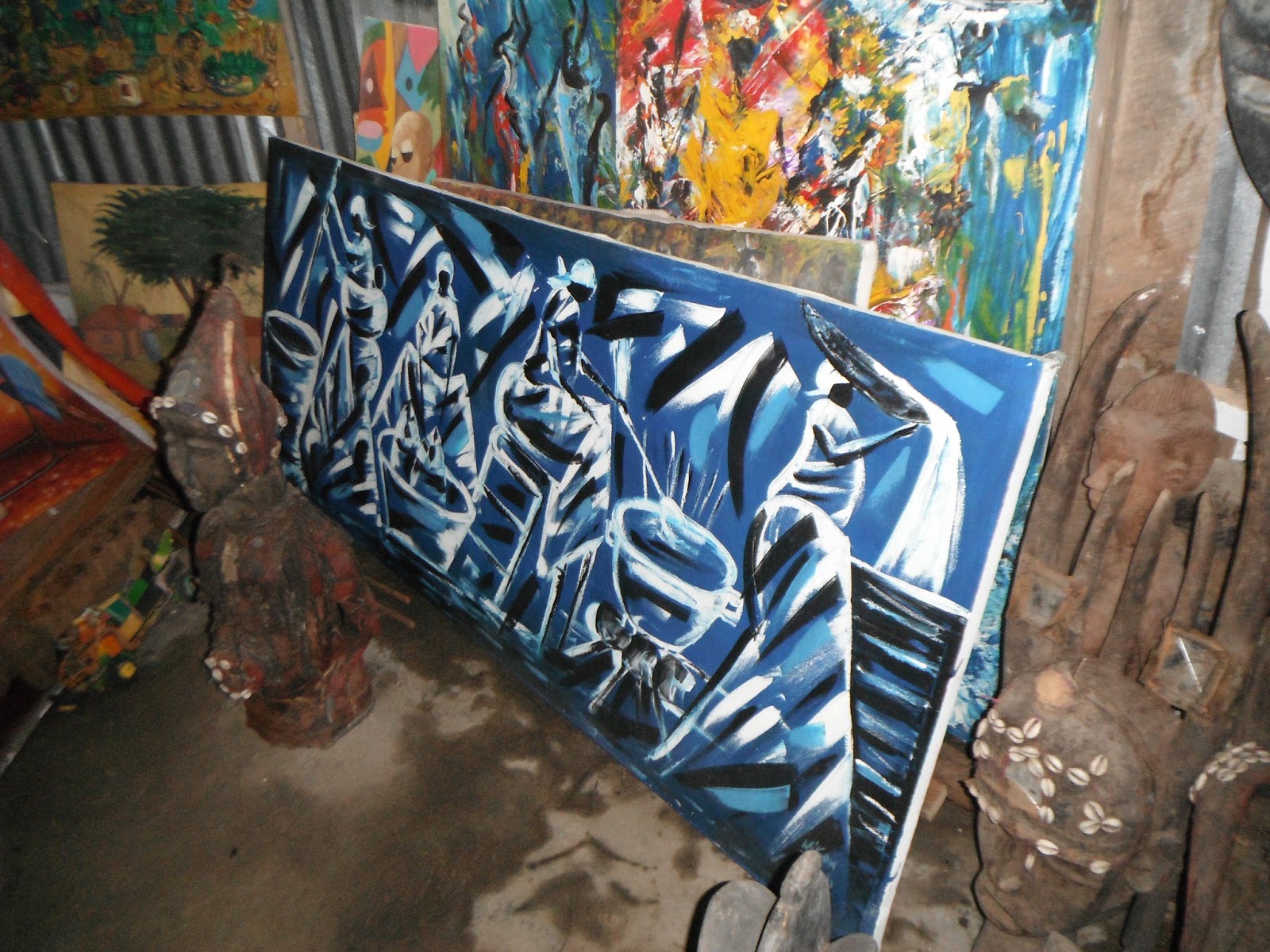Making Good
Tuesday, August 6, 2013
My health survey: 180 days in rural Liberia shunning SPF, DEET, anti-bacterial products and other items marketed toward the paranoid person
You know, back in the day, when all good science was done by some guy with an idea who did experiments using himself as the sample? Sadly, that DIY scientific research is being replaced by this complicated, federally funded, human subjects compliant bureaucracy. I decided to go the old fashioned route - and assess three products I dislike (okay, now my survey is flawed for being biased) - SPF, DEET, and anti-bactierial hand sanitizer. Answering the question: Is this stuff really necessary?
Background: For years I have had few nice things to say about SPF products, DEET, and anti-bacterial hand sanitizer. I shun them all. Why?
SPF: Why should I put some chemically product all over the largest, pourous organ of my body? There might be certain occassions, like a day of direct sun on the beach, but daily? As part of a daily routine? No.
DEET: What are you trying to do - detract the mosquitoes or poison me?
Anti-bacterial hand sanitizer: Geez, I hate that stuff. Killing most germ, leaving the strongest ones to thrive. When you could do the same job with this little innovation called soap.
But, I thought "There's a time an a place for everything. Maybe rural Liberia is an occassion to use such products? Can I do without them in a poor, rural country?" So I did my own little study.
So, let's assess my use, or lack of use, of these products over a 6-month period in a malaria region, with no piped water, in Liberia, a country with sub-par infrastructure, ranked among the poorest countries in the world, and, tied with North Korea when Foreign Policy magazine did its 2013 ranking of failed states.
Purpose: Determine the effect of severely limited to no use of these products while living in rural Liberia.
Methodology: Don't use the products unless other methods are ineffective, resulting in clear health problems. Instead, use common sense, avoid the sun, use basic soap, don't sit outside at dusk, don't touch the little kids (kids are filthy), and don't buy food from kids. And eat like a local.
Results:
Total number of days of time in region: 180 days
SPF:
Number of days I applied SPF: 1 (Trader Joe SPF 50 spray, used during one beach day at Fishtown Beach, near Harper)
Number of days I thought "Geez! You got too much sun today!": 2 days out of 180
Alternative strategy: Didn't lie in the sun, wore a sun hat and/or used a shawl, stayed in the shade if possible
DEET:
Number of days I used DEET mosquito repellant: 0 days
Number of days I thought "Geez! You've been eaten alive. You should have used DEET.": 0 days
Alternative strategy: I periodically (maybe 10 times) used one of two types of anti-mosquito products - both are natural products. I stayed inside at dusk, the time when mosquitoes are most likely to bite.
Number of evenings I slept under a (treated) mosquito net: 1 (because there was a rat in my house and I didn't want the rat climbing into bed with me) (there were essentially no mosquitoes in my house - why use the net?)
Anti-bacterial hand sanitizer (and any other anti-bacterial product, such as special soap):
Number of days I used anti-bacterial hand sanitizer: 6 days (days I was traveling with no access to soap and water - after relieving myself in ditches on the side of the road, or prior to eating if I hadn't washed my hands for many hours)
Number of days I was sick: 1 day (feeling achy)
Number of colds I had: 2 mild colds, one after an exhausting trip in Ghana
Consuming food and water in local establishments or at home:
Number of days I ate in local restaurants with "questionable" sanitary conditions and/or no access to piped water (or hand-washing facilities for customers): at least 150/180
Number of days I ate street food: plenty (number unknown - maybe 40?)
Number of days I used bottled or other specially filtered water to brush my teeth: 1 (Instead, I used my regular hand-pump water, or rain water collected off the roof into an open basin.)
Number of days I used bleach to wash my food: 0
Number of times I used warm or hot (as opposed to cold) water to wash my dishes: 0 (I did use soap; I never cooked meat)
Number of days I drank my filtered water out of a water bottle with an external straw (not very sanitary): 180
Number of days I had serious stomach issues associated with dirty water, food, etc.: 0
Number of Imodium tablets used during the 180 day period: 6 tablets
Anti-bacterial gels for cuts:
Number of days I used anti-bacterial gels for cuts: 4-5 (used on feet)
Number of infections I had associated with cuts: 0
Percentage of times I wore sandals (as opposed to sneakers): nearly 100% (wore sneakers 3 times in 6 months)
Passing germs from hand-to-hand:
Number of days I shook hands with multiple people: 180 (in Liberia, one shakes hands constantly)
Number of times I was able to wash my hands after shaking hands: very infrequently (and I used hand sanitizers as a substitute only once - when I had a cut on my hand)
Number of associated infections: 0
Analysis:
My "SPF, DEET, and anti-bacterial products are a bunch of BS." theory holds up in rural Liberia. These products are unnecessary and therefore a poor use of packing space. Moreover, no one living in the developed world who is in moderately good health needs to be using these products on a regular basis.
In addition, the "don't eat the street food and brush your teeth with bottled water only" warning is unnecessary in my region of Liberia.
Summary: In short, my assessment that people in developed world are unnecessarily paranoid and needs to chill has been supported by the fact that I didn't die (or get much more than a cold) during my 180 day study.
Sunday, August 4, 2013
Starting a Library
They call it a "reading room", I call it a "library". Regardless, it is a success. At the end of the day, there is now a place that students can go into to read, study, and do research.
When I arrived at Barclayville Central High School in February, 2013, there was no such place. There was no such resource in the school, and there was no such resource in the "city". Which means, there was no such place in the entire county. And to clarify, there also was/is no place to purchase books. No dictionaries, no Bibles, no textbooks, and certainly no novels. Also, there are no newspapers and no magazines - unless you read French - which most people do not. Finally, there is no internet cafe.
But there was, I learned, after speaking to a member of the Ministry of Education decentralization team, an empty room to be used for such a purpose.
I tend to believe that most basic projects can be done with little to no funding. And I was looking for a tangible project that I could complete during my short time in Barclayville.
So, instead of spending my time thinking about funding and proposals, I started asking questions: "So, there are books in storage. On a bookshelf. Can we move them in here?" "Are there other books? Can we move them? When? Let me know if I can carry anything. I am happy to carry books." (A good way to get manual tasks done is to express interest in doing it myself - the response is often for someone to do that task before I can hike up my skirt and start hauling stuff.)
In the end, in less than a month, we went from an empty, locked room to a room with bookshelves, additional shelves on their way, books on the shelves, and students crowded on benches to use the resources. Yes, we had to wait a few additional weeks for the additional shelves and table and benches. Yes, I spent a couple of Saturdays with a damp dust rag and broom. But by the end of the semester, I was helping students find materials for their math and science classes, I had students doing research for English assignments, and teachers were coming into the room to consult textbooks.

The books are old, sometimes in poor condition, and limited. There is one dictionary in poor condition. The encyclopedias are a decade old. And the Liberian history section desperately needs materials. But there is now something to build upon.
Thanks to the generosity of friends and acquaintances, magazines were sent to diversify the reading materials in the library. And thanks to the existence of the facility, the principal was able to contact authorities in Monrovia to say "Now we have a reading room. Please send us the staff person you promised us, because now he will have a job - staffing the room during school days." He arrived several weeks later.
I think it is natural for people to want something to point to and say "I did that." That's why we hang degrees on our walls, take and post photos of ourselves online, and show people things. "Look! I did that." We also want to be remembered. "Be my online friend, take my business card, let's get a photo of us together - remember me." And finally, we like to be acknowledged.
In addition to the satisfaction I got from being able to say "Look! The resource is there now." was the feedback I got from students, administrators, and others in the community. On the street, a student came up to me and said "It wasn't until you came that we got a reading room. Thank you." At my farewell ceremony, it was mentioned by both students and administrators.
I was in Barclayville for a mere six months. It will take a long time, a decade or more, to bring the Liberian education system to where it needs to be. There will be many other teachers - from the United States, Nigeria, Liberia, and elsewhere teaching in that school in the coming year. My hope is that the reading room will be a resource they all can benefit from and build upon. But, there is also a small part of me, the part that says "Look. I did that. And remember me.", that wouldn't mind if one day, when asked who started the reading room, someone answered "There was a teacher, Ms. Gray, who came from America - the first one we had since the conflict. The first one in the all of Grand Kru county, in fact. She started it. She would come to the school on Saturday in these crazy chicken pants, with a bucket and broom, to clean and to organize the books. She started it."
When I arrived at Barclayville Central High School in February, 2013, there was no such place. There was no such resource in the school, and there was no such resource in the "city". Which means, there was no such place in the entire county. And to clarify, there also was/is no place to purchase books. No dictionaries, no Bibles, no textbooks, and certainly no novels. Also, there are no newspapers and no magazines - unless you read French - which most people do not. Finally, there is no internet cafe.
But there was, I learned, after speaking to a member of the Ministry of Education decentralization team, an empty room to be used for such a purpose.
I tend to believe that most basic projects can be done with little to no funding. And I was looking for a tangible project that I could complete during my short time in Barclayville.
So, instead of spending my time thinking about funding and proposals, I started asking questions: "So, there are books in storage. On a bookshelf. Can we move them in here?" "Are there other books? Can we move them? When? Let me know if I can carry anything. I am happy to carry books." (A good way to get manual tasks done is to express interest in doing it myself - the response is often for someone to do that task before I can hike up my skirt and start hauling stuff.)
In the end, in less than a month, we went from an empty, locked room to a room with bookshelves, additional shelves on their way, books on the shelves, and students crowded on benches to use the resources. Yes, we had to wait a few additional weeks for the additional shelves and table and benches. Yes, I spent a couple of Saturdays with a damp dust rag and broom. But by the end of the semester, I was helping students find materials for their math and science classes, I had students doing research for English assignments, and teachers were coming into the room to consult textbooks.

 |
| Reference shelf: Old encyclopedias, one dictionary, and two atlases. |
Thanks to the generosity of friends and acquaintances, magazines were sent to diversify the reading materials in the library. And thanks to the existence of the facility, the principal was able to contact authorities in Monrovia to say "Now we have a reading room. Please send us the staff person you promised us, because now he will have a job - staffing the room during school days." He arrived several weeks later.
 |
| The man brought from Monrovia to serve as Coordinator of the Reading Room. |
I think it is natural for people to want something to point to and say "I did that." That's why we hang degrees on our walls, take and post photos of ourselves online, and show people things. "Look! I did that." We also want to be remembered. "Be my online friend, take my business card, let's get a photo of us together - remember me." And finally, we like to be acknowledged.
In addition to the satisfaction I got from being able to say "Look! The resource is there now." was the feedback I got from students, administrators, and others in the community. On the street, a student came up to me and said "It wasn't until you came that we got a reading room. Thank you." At my farewell ceremony, it was mentioned by both students and administrators.
I was in Barclayville for a mere six months. It will take a long time, a decade or more, to bring the Liberian education system to where it needs to be. There will be many other teachers - from the United States, Nigeria, Liberia, and elsewhere teaching in that school in the coming year. My hope is that the reading room will be a resource they all can benefit from and build upon. But, there is also a small part of me, the part that says "Look. I did that. And remember me.", that wouldn't mind if one day, when asked who started the reading room, someone answered "There was a teacher, Ms. Gray, who came from America - the first one we had since the conflict. The first one in the all of Grand Kru county, in fact. She started it. She would come to the school on Saturday in these crazy chicken pants, with a bucket and broom, to clean and to organize the books. She started it."
The People You Meet
The thing people sometimes say when someone is going somewhere "new" for an extended period of time is "I couldn't image going there by myself." The thing is that, once you get there, you aren't by yourself. Below are a few of the people I encountered.
 | |
| Sis Patience's Cook shop - where I ate about 70% of my meals, or so it seemed. She knew that my favorite was rice and beans. |
 |
| Regina, my 11th grade student and president of the BCHS Girl's Club. She rolled her eyes when I tried washing my clothes with a wash board. And always called out "Miss Gray!" when I walked by. |
 |
| Johnny Toe Jr. (left) and Myking Suah (both in 10th grade) interview me at the Grand Kru radio station. |
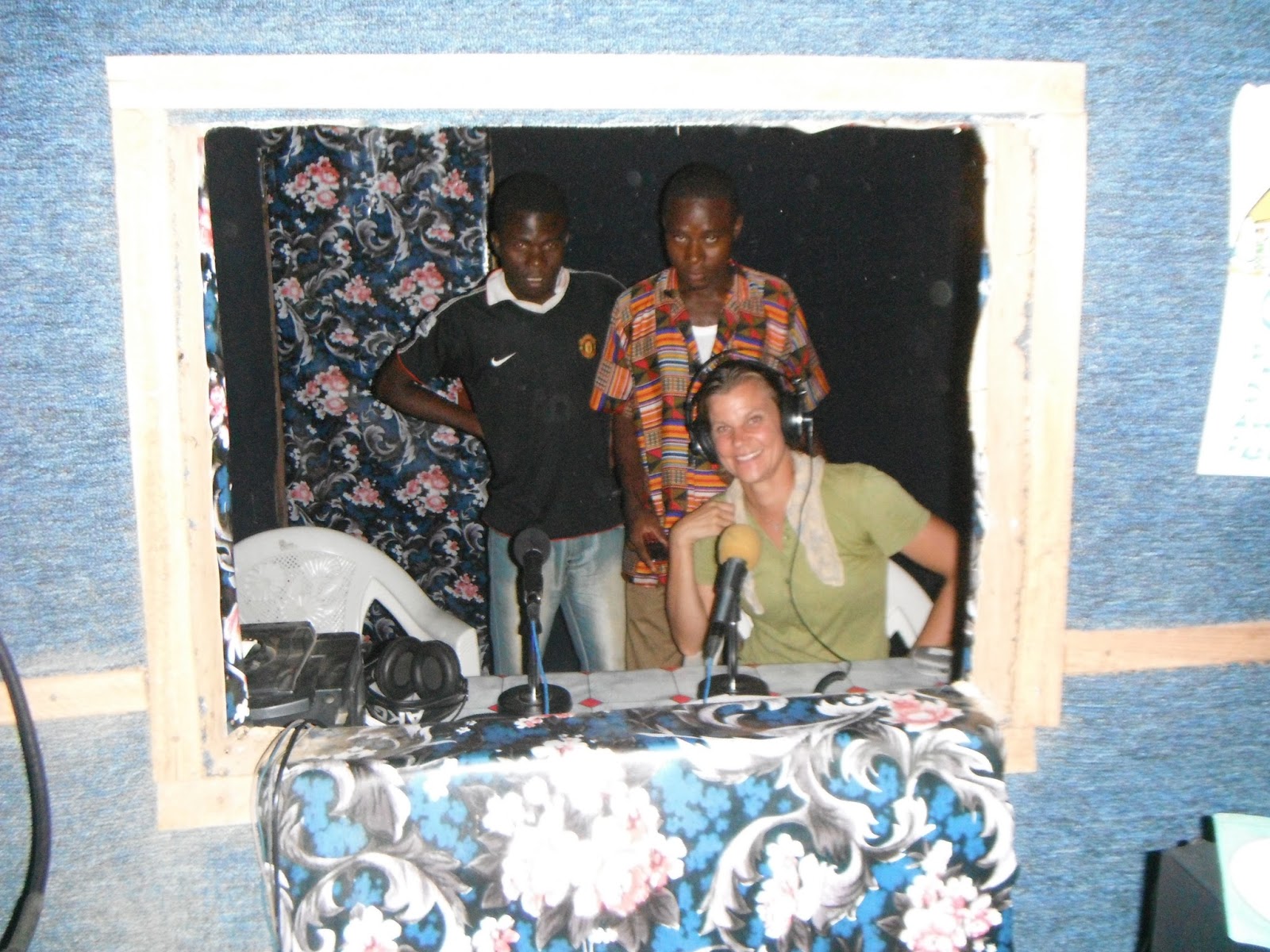 |
| Johnny Toe Jr. (left) and Myking Suah (both in 10th grade) interview me at the Grand Kru radio station. |
 |
| The boy who lives across the street. In front of my house. |
 |
| German Agro staff, including Martin Embola, at a local tea shop. |
 |
| German Agro staff, including Martin Embola, at a local tea shop. They are talking to Mah Nyanti (standing, left), the BCHS's agriculture teacher. |
 |
| Football match. |
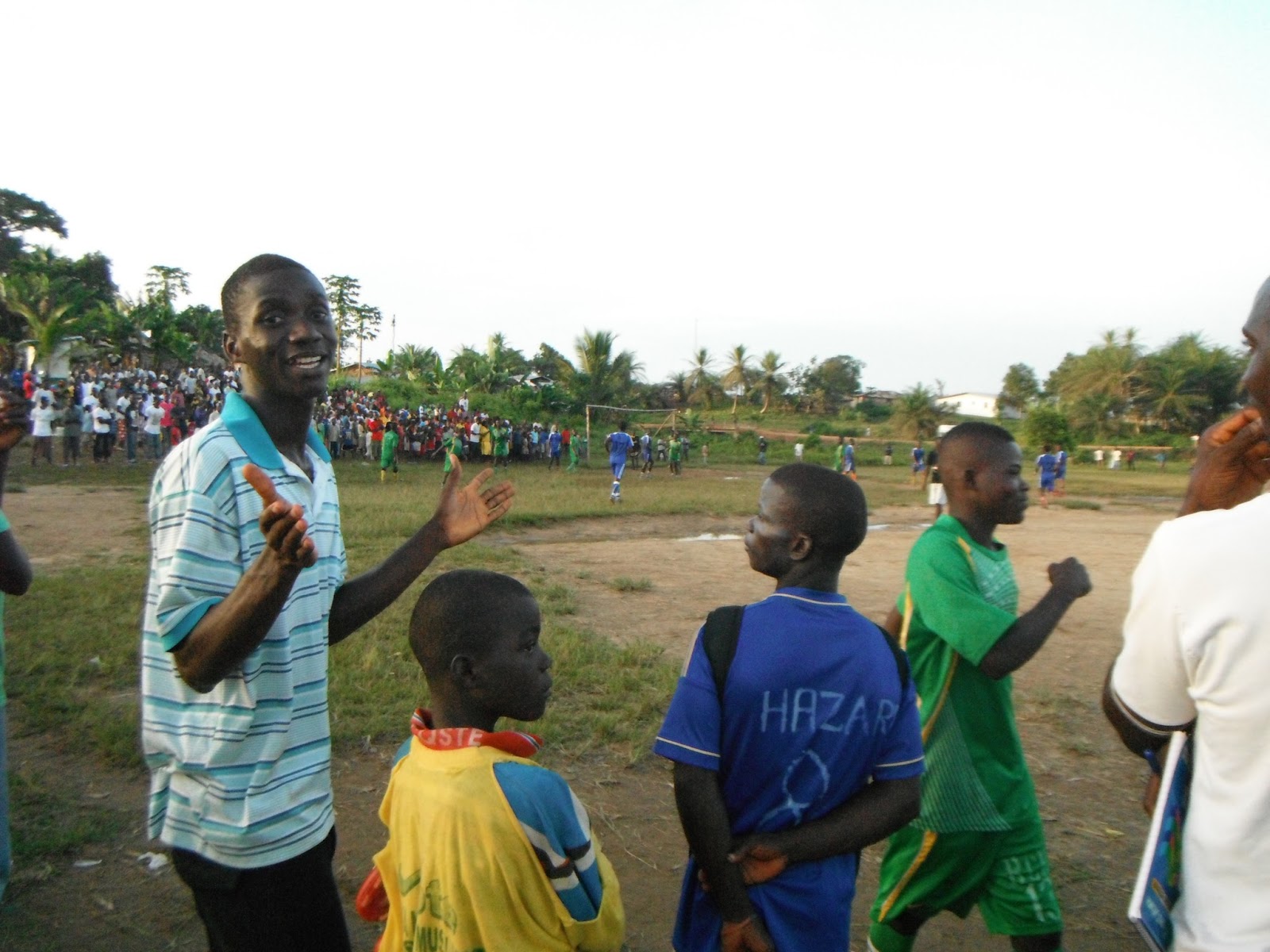 |
| At a football match. The young man on the left in the blue shirt was an 11th grader (with an interest in physics and math). |
 |
| Langford explains basics of beekeeping to BCHS students. |
 |
| Students at the school's "Queen contest" - a fundraiser for the school. |
 |
| Jackson Wisseh (left), the principal, and teacher John Faya (right) at a school function. |
 |
| Jackson Wisseh (left), the principal, teacher John Faya (center), and Anthony Nyanti (right), the VP, at a school function. |
 |
| Mr. Nyswah and teacher walking home after school. |
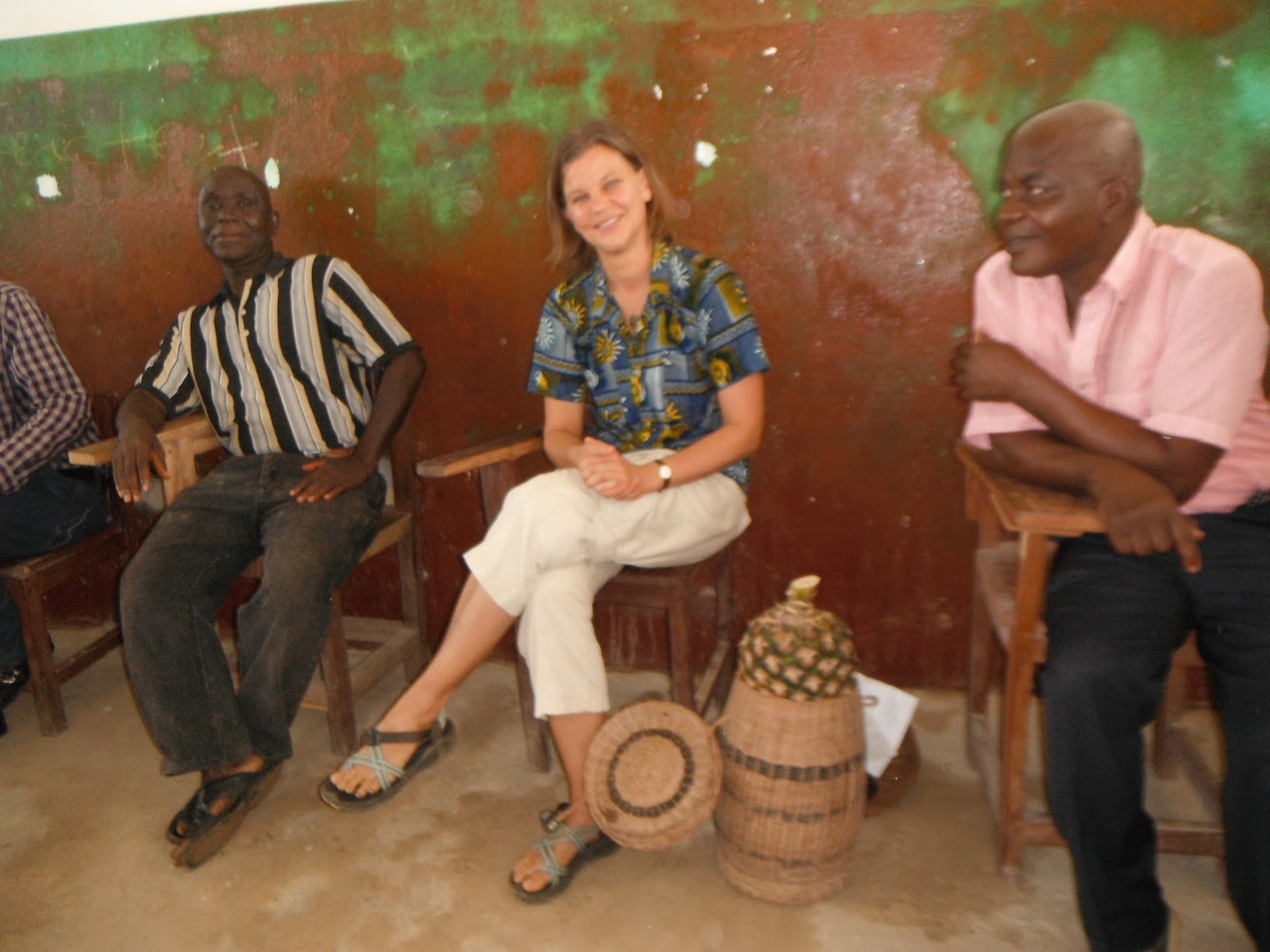 |
| At my farewell ceremony. Mr. Nyeswah, the administrative VP, is on my left. A fellow teacher is on my right. |
 |
| Students at my farewell ceremony. |
 |
| Students at my farewell ceremony. |
 |
| The teaching staff at BCHS. |
 |
| The BCHS administrative and teaching staff. |
 |
| With the security guard and office assistant (left). She sold peanut butter squares that I would buy for "breakfast". They were a mixture of peanut butter, ground cassava, and sugar. |
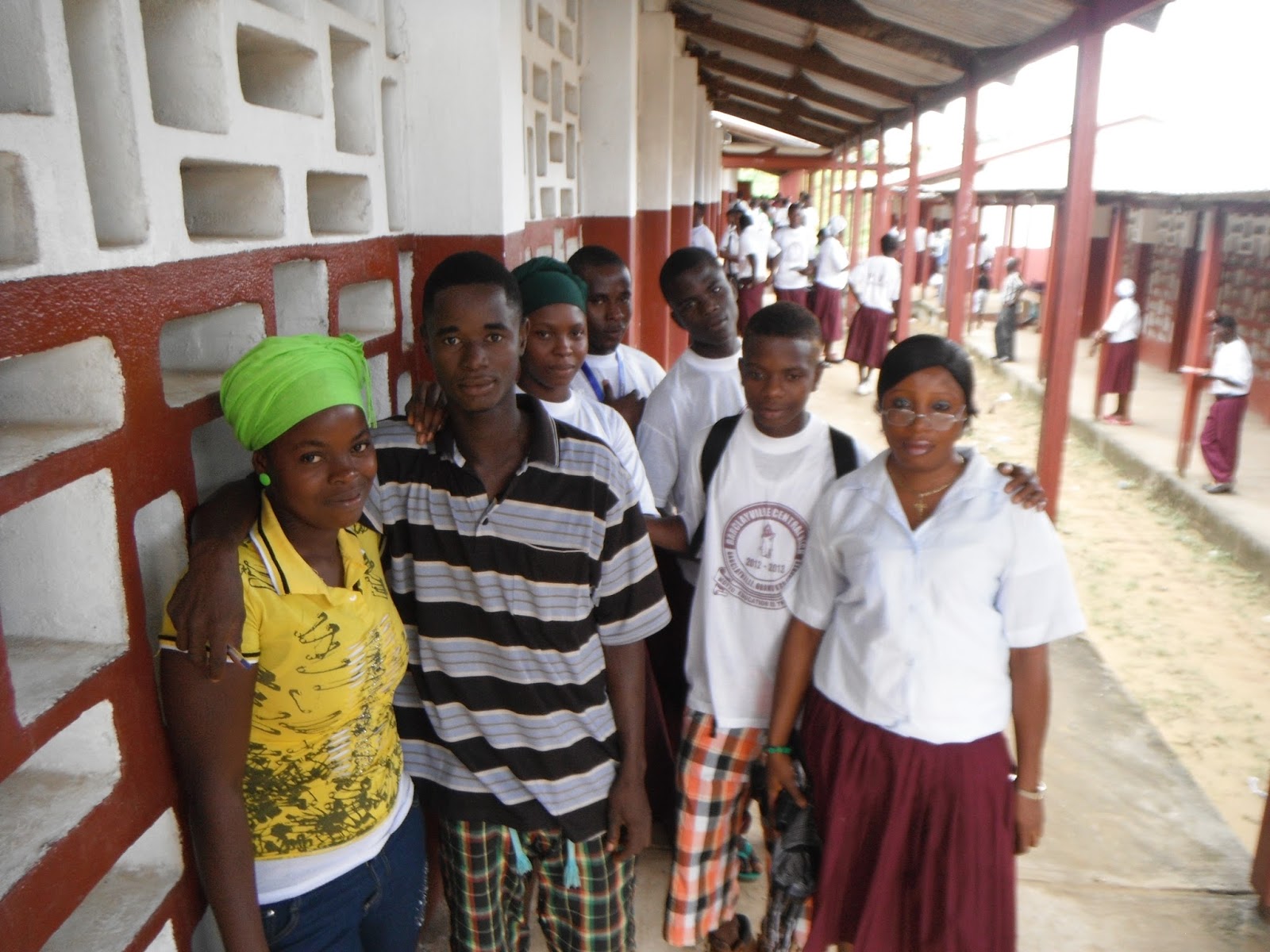 |
| Students after my farewell ceremony. 10th and 11th graders. |
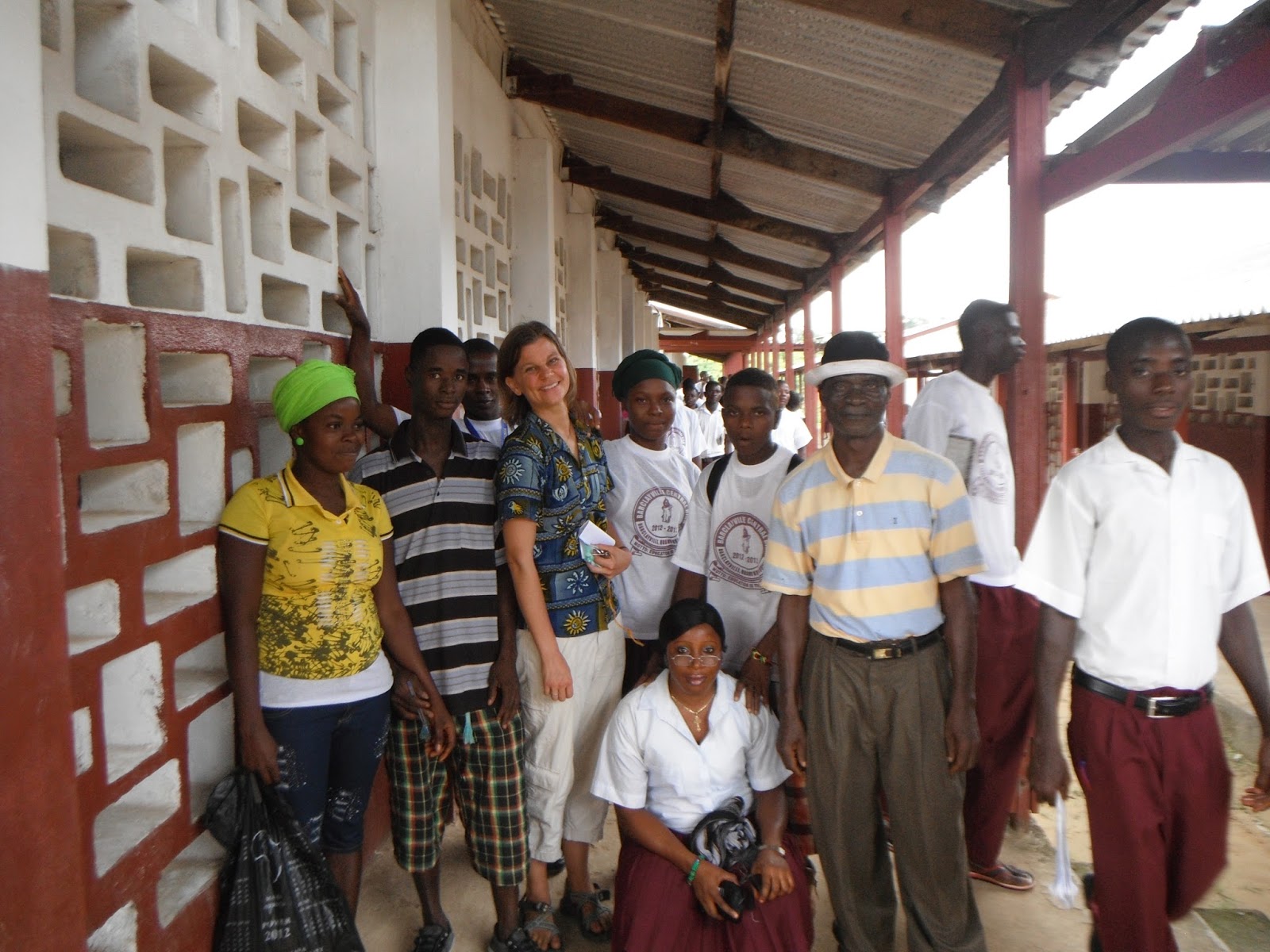 |
| Students after my farewell ceremony. 10th and 11th graders. Including the principal (in the hat). |
 |
| At an UNMIL party at the beach. UNMIL consisted of a military side and civilian side (and the military side recently left). The military side was furnished by the Pakistanis. |
 |
| At UNMIL beach party. Rashid (right) and Pakistani soldier (left) help themselves to rice and goat meat cooked in an enormous pot. |
 |
| Alison O. speaks at UN Peacekeepers Day. A Liberian member of the UNMIL staff, he is not from Barclayville, but has worked there for many years. |
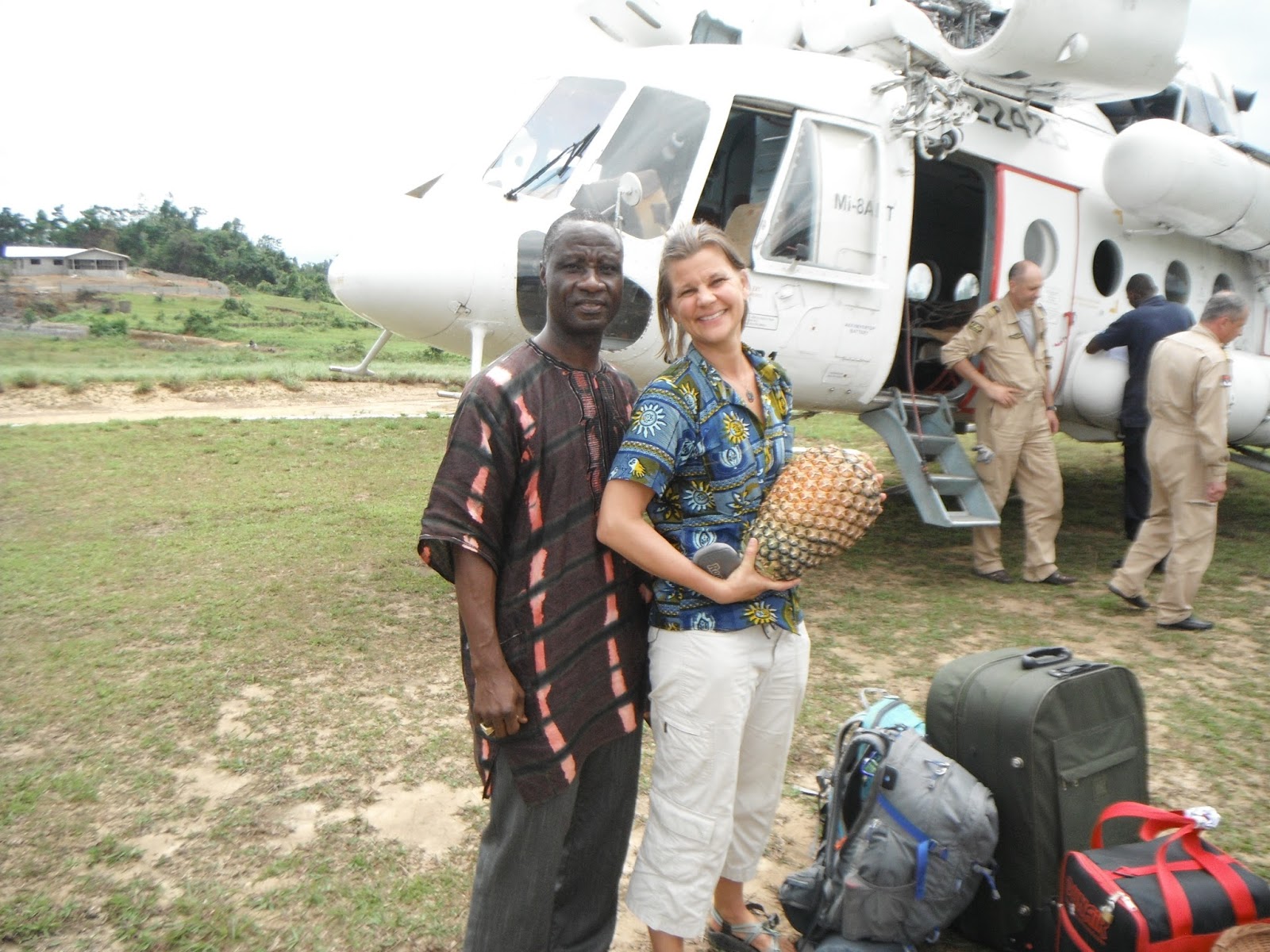 |
| With Alison. Right before departing Barclayville. I am holding a HUGE pineapple given to my at the ceremony on behalf of the people in my neighborhood. |
 |
| Rabi and her friend Sharon, during our visit to Volta. |
Little Spoons
Every mainstream tourist shop in the Western world seems to
have the souvenir that I love to hate:
little spoons. Those little
silver colored spoons with the name and perhaps an image of the location
somewhere on the spoon. They are often
of cheap quality and come in a white plastic box with a clear cover and red
fabric inside. I think they are
ugly. And a dumb way to remember a place.
However, there is something awesome about little spoons. They are small and easy to travel with. Given some of the items I have traveled home with, “small and easy to travel with” is very attractive. Over the past few years I have brought home honey in glass jars (one of which broke en route), water color paintings (that needed to be kept dry), alcohol made in the Korea that the US doesn’t like, heavy and bulky kilims (aka woven floor coverings that aren’t carpets; carpets are knotted, not woven) and various other odd objects. (I also once arrived at Logan airport with a set of IKEA euro-square pillows before they were easily available in the US; imagine my conversation with the customs official. “Pillows?” “Yes, pillows.”)
After spending six months in Liberia, I was searching for
appropriate items for family and myself.
Aware that my most over-the-top gift was from a member country of the axis-of
evil, I was at a loss for how to top that one.
Thankfully for my law-abiding family, I decided that Grand Kru gold
dust, 18 grams of it, which a couple engaged in illegal gold mining brought to
my house one afternoon, probably wasn’t a good gift. Nor should I ask if they knew anyone involved
in the illegal diamond market. It’s one
thing to not declare a box of chocolate, it’s another thing to violate
international law. (Should I ever travel
to Afghanistan, heroine will not be my souvenir of choice either.)
I found my items for family – not as small as little spoons,
but least not breakable. I, however,
always get items for myself also. Given
that Liberia doesn’t specialize in kilims or carpets, I moved on to my other souvenir
of choice - paintings. Yup. I, who hate blank walls, have a tendency to
purchase paintings and other walls art.
My requirement for paintings is that the image needs to
represent something I have seen in the country.
It needs to depict an image in my head, from my experience. It needs to speak to me.
However, I also have a talent for falling in love with either the most
expensive or otherwise most prohibitive items available. For example, in the Monrovia American Embassy, there is a
fantastic (and very large painting) of the rubber plantations. I saw it and fell in love with it. Unfortunately, a) it is not for sale, and b)
if it were, it would be thousands of dollars.
When I arrived in Monrovia in July for my final stay, I headed right
for the art shops. There was one
painting I had seen months before that I remembered and wanted. A woman with a washboard doing laundry.
While in those shops, I saw the thing I
really wanted – a painting of rubber plantations. The painting of the woman doing laundry
was a reasonable size, given that oil
paintings can be removed from frames, rolled up, and put in a suitcase. The painting of the rubber plantation was a
larger and might not fit in a suitcase (rolled up), but it was awesome and
worth the effort. So, I decided that
both paintings needed to come home with me.
 |
| Washboard painting being removed from frame and rolled up. |
 |
| Painting depicting Liberians working in a rubber plantation - Firestone is the most well-known. |
And then I looked in the back of the shop. “Wow.
That’s awesome. Wow. That’s huge.
Crap. I want that.”
 |
| Art shop in Monrovia. My painting is the large blue, black and white one on the ground. |
A third
painting. Depicting four women doing various
tasks – cooking, pouring water from a basin on her head, cleaning fish, and pounding cassava. The woman carrying water reminds me of my
neighbor Rita who helped me fill the barrel of water in my bathroom when I
arrived. The woman cooking reminds me of
the women in the market on Saturdays who fry doughnuts. The women cleaning fish remind me of the
women who purchase the fish in Picnicess and travel to Barclayville with fish
on their heads to sell. And the woman pounding food reminds me of the many women pounding cassava. All those in awesome bold blue, black
and white.
I asked the price,
hoping it would be at least $300, because if it was more than I wanted to pay,
I could easily walk away.
“How much is that one?”
“$150”.
“$150”.
And in my head, I thought “Crap.
$150. I could get him down to
$100. Now, I need to buy it.”
A few days later, I showed up with the cash and, for $110, purchased a painting
that is a meter high and longer than I am tall.
It is huge. But it is also an
original piece of art that reminds me of Barclayville and some of the women
there.
I have jokingly explaining to people that “I am decorating
my house, which I don’t yet have. By the
time I get the house, it’ll be completed decorated.” If I liked little spoons, somewhere I would have
a displace case with a whole bunch of those silly items stacked next to each
other and either blank walls or walls covered in faux art from Pier 1 or IKEA. Instead, I now need home with sufficient wall
space to hang all of my various treasures, including a ginormous painting.
Saturday, May 25, 2013
Suggested Liberia pack list
This post is for the group of volunteers who are destined to
arrive in Liberia this summer. A pack
list and list of helpful hints…
Who is this
person? (Aka is this the kind of person
who has useful information for me?)
Background: I have
been in Liberia since the end of January, and will be here until the end of
July. I am serving as a Response
volunteer, one of those folks who already served elsewhere for two years, and
is now doing a short-term gig. My
original country of service was W. Russia (’99-01). And then, after over a decade in Boston, it
was time to get out. First I spent eight
months in the Republic of Georgia and then arrived in Liberia. (My time in Boston did involve some travel,
largely for vacation, and it included nearly a month in Tamale, Ghana.)
I would jokingly describe myself as a lover of what I term
“hippie-dippie” things. I avoid
chemically stuff (including SPF, Deet, etc.), love my natural products store,
and seek out interesting whole grains. At
home, I buy fresh organic coffee and organic produce. In the US I am a fish-eating vegetarian. I am a self-described foodie, and I love to
support good microbreweries. I love my
internet connection, learning new things, and generally dislike watching
tv.
So, that is the background of the person providing you with
this list.
For the ladies:
- shawl - this will be to keep you warm on the plane, keep the sun off, allow you some privacy when changing (or relieving yourself on the side of the road), etc.
- Reusable, washable, boilable feminine supplies like “diva cup” and “glad rags” – Yes, everyone not familiar with reusable products just exclaimed “Eww! That’s gross!” But, honestly, there are very few disposable products here, so assume your preferred products will not be available. Instead of bringing a 2 year supply (and needing to deal with disposal issues – and risking that used products will be sitting in an open hole attracting animals – or that they get rained on), consider if reusable products would work for you. Email me if you have further questions.
- Monestat or similar product in a tube - Even if you have never used such a product in the past, it is worth it to bring it along.
- bra with adjustable straps – so that when you have clothing made and it turns out to be off the shoulder, you have a bra to wear
- This isn’t packable, but if you are able to take a self-defence course before you depart, do it! Liberia is a safe country, but there are crazy people everywhere. You don’t need the course because Liberia is unsafe; you need the course because when you’re in a new place and situations are unknown, it’s nice to feel that you know what to do if something goes wrong. There’s a great self-defence program called “R.A.D.” If you are a university student, contact your campus police department to see if they offer trainings.
- shawl - this will be to keep you warm on the plane, keep the sun off, allow you some privacy when changing (or relieving yourself on the side of the road), etc.
- Reusable, washable, boilable feminine supplies like “diva cup” and “glad rags” – Yes, everyone not familiar with reusable products just exclaimed “Eww! That’s gross!” But, honestly, there are very few disposable products here, so assume your preferred products will not be available. Instead of bringing a 2 year supply (and needing to deal with disposal issues – and risking that used products will be sitting in an open hole attracting animals – or that they get rained on), consider if reusable products would work for you. Email me if you have further questions.
- Monestat or similar product in a tube - Even if you have never used such a product in the past, it is worth it to bring it along.
- bra with adjustable straps – so that when you have clothing made and it turns out to be off the shoulder, you have a bra to wear
- This isn’t packable, but if you are able to take a self-defence course before you depart, do it! Liberia is a safe country, but there are crazy people everywhere. You don’t need the course because Liberia is unsafe; you need the course because when you’re in a new place and situations are unknown, it’s nice to feel that you know what to do if something goes wrong. There’s a great self-defence program called “R.A.D.” If you are a university student, contact your campus police department to see if they offer trainings.
For those who eat:
- Gatorade – enjoyable and hydrating powdery goodness
- spices – seriously! Spices here are limited to spicy pepper and onions and maybe garlic (took me 2 months to find it) I brought curry powder, cinnamon, cumin, coriander, mustard powder, garlic powder, and 100% maple sugar pellets (for oatmeal). You also might consider oregano, basil, herb d’provence, lemon pepper, and anything else you usually use to cook with. Many of these, however, can be purchased in Monrovia, too. (Helpful hint: you can make brown sugar by mixing white sugar and molasses, so if you need brown sugar on your oatmeal, bring molasses.)
- coffee filter and coffee cone – yes, I buy real coffee in Monrovia and pour it through a canvas coffee filter (in a plastic coffee cone) every morning – and then add powdered milk
- tea stuff – Yes, I brought nice regular and decaf tea from the US. I brought looseleaf with little reusable tea bags
- coil water boiler – while it is likely that you will not have electricity, because they are small, consider a coil hot water boiler. If you have electricity, it will allow you to quickly boil water (and then put it into a thermos for later).
- tupperware that is critter-proof – Also, I actually have recently purchased a few (not great) plastic containers so that I can go to local “chop shops” and bring ½ of my rice home to be eaten for breakfast the next day
- Gatorade – enjoyable and hydrating powdery goodness
- spices – seriously! Spices here are limited to spicy pepper and onions and maybe garlic (took me 2 months to find it) I brought curry powder, cinnamon, cumin, coriander, mustard powder, garlic powder, and 100% maple sugar pellets (for oatmeal). You also might consider oregano, basil, herb d’provence, lemon pepper, and anything else you usually use to cook with. Many of these, however, can be purchased in Monrovia, too. (Helpful hint: you can make brown sugar by mixing white sugar and molasses, so if you need brown sugar on your oatmeal, bring molasses.)
- coffee filter and coffee cone – yes, I buy real coffee in Monrovia and pour it through a canvas coffee filter (in a plastic coffee cone) every morning – and then add powdered milk
- tea stuff – Yes, I brought nice regular and decaf tea from the US. I brought looseleaf with little reusable tea bags
- coil water boiler – while it is likely that you will not have electricity, because they are small, consider a coil hot water boiler. If you have electricity, it will allow you to quickly boil water (and then put it into a thermos for later).
- tupperware that is critter-proof – Also, I actually have recently purchased a few (not great) plastic containers so that I can go to local “chop shops” and bring ½ of my rice home to be eaten for breakfast the next day
For those who will be
in the sun, rain, or outside:
- hippie-dippie SPF products
- good sunhat – I have a big floppy sunhat from REI which I sewed ties to so that it doesn’t blow off in the wind; better than sunscreen
- good sunglasses – If you’re going to wear them every day, get something that you like.
- hippie-dippie bug spray - I have “organic bite blocker xtreme” – which works on skin and as a spray to prevent critters like ants from walking where I don’t want them (like on my jars of food).
- hippie-dippie SPF products
- good sunhat – I have a big floppy sunhat from REI which I sewed ties to so that it doesn’t blow off in the wind; better than sunscreen
- good sunglasses – If you’re going to wear them every day, get something that you like.
- hippie-dippie bug spray - I have “organic bite blocker xtreme” – which works on skin and as a spray to prevent critters like ants from walking where I don’t want them (like on my jars of food).
For those who like to
sleep:
- Ear plugs (roosters!)
- eye mask
- travel pillow
- Thermarest matress pad (seriously, I went to REI as a last minute errand and got one and it has made my life much better; you put it over the foam mattress (that alone you will uncomfortably sink into) and sleep really well; buy an REI membership, and use the 20% benefit for the mattress)
- Sleep sheet (if you’re trying to justify the cost of a silk one, try this: “silk is easy to wash and dries really quickly”)
- Ear plugs (roosters!)
- eye mask
- travel pillow
- Thermarest matress pad (seriously, I went to REI as a last minute errand and got one and it has made my life much better; you put it over the foam mattress (that alone you will uncomfortably sink into) and sleep really well; buy an REI membership, and use the 20% benefit for the mattress)
- Sleep sheet (if you’re trying to justify the cost of a silk one, try this: “silk is easy to wash and dries really quickly”)
For those who use
technology:
- smartphone – you can get data plans here
- computer – I brought an old Dell netbook. It died, but it was still worth it.
- external hard drive – the reason I didn’t have a heart attack when my computer died is because I knew almost everything I had was backed up.
- Camera – consider a waterproof one
- memory card for your camera – make sure it’s big enough for lots of photos – you don’t want to be doing something cool and run out of space on your card
- world band receiver radio (aka a radio that gets station 11000 so that you can listen to BBC)
- solar charger – like “Power Monkey” – I have the one you can charge by plugging it into the wall, I have electricity perhaps 3 hours an evening and charge it up so that I can charge a phone, kindle, etc. as needed (though we all got new awesome lamps that can do the same job, so it is your call)
- Kindle or other ereader with library books (and reference books and cook book and to use in class as PDF reader) – you might be issued one, but if you can bring one from home, you have time to a) get a membership at a library with electronic books and download a few dozen, and b) turn the wifi off so that they don’t expire after the 1 week loan time is over; look into the Boston Public Library network for an example of a library network with electronic resources. A (password protected) ereader is also a great way to bring reading materials that might raise eyebrows if religious conservator colleagues saw the paper version of the book on your book shelf.
- MP3 player with music (don’t forget the holiday music!) and a few audio books (for days when you’re sick and need entertainment)
- Hand crank radio – not crucial, but depending on where you are a basic radio with a flash light is useful
- Portable LED solar powered devices (because you will want light at night)
- Universal adapters – I thought I didn’t need one, and then I received a gadget with an odd shaped outlet, and was glad to have the adapter
- smartphone – you can get data plans here
- computer – I brought an old Dell netbook. It died, but it was still worth it.
- external hard drive – the reason I didn’t have a heart attack when my computer died is because I knew almost everything I had was backed up.
- Camera – consider a waterproof one
- memory card for your camera – make sure it’s big enough for lots of photos – you don’t want to be doing something cool and run out of space on your card
- world band receiver radio (aka a radio that gets station 11000 so that you can listen to BBC)
- solar charger – like “Power Monkey” – I have the one you can charge by plugging it into the wall, I have electricity perhaps 3 hours an evening and charge it up so that I can charge a phone, kindle, etc. as needed (though we all got new awesome lamps that can do the same job, so it is your call)
- Kindle or other ereader with library books (and reference books and cook book and to use in class as PDF reader) – you might be issued one, but if you can bring one from home, you have time to a) get a membership at a library with electronic books and download a few dozen, and b) turn the wifi off so that they don’t expire after the 1 week loan time is over; look into the Boston Public Library network for an example of a library network with electronic resources. A (password protected) ereader is also a great way to bring reading materials that might raise eyebrows if religious conservator colleagues saw the paper version of the book on your book shelf.
- MP3 player with music (don’t forget the holiday music!) and a few audio books (for days when you’re sick and need entertainment)
- Hand crank radio – not crucial, but depending on where you are a basic radio with a flash light is useful
- Portable LED solar powered devices (because you will want light at night)
- Universal adapters – I thought I didn’t need one, and then I received a gadget with an odd shaped outlet, and was glad to have the adapter
Thoughts on
clothing:
- bandanas (lots of fun colors and patterns – to be used to tie hair, filter dust, wipe sweat from face)
- shoes: I have a pair of chacos and a pair of black Ecco leather sandals; I don’t run here so my running shoes thusfar haven’t been useful
- bathing suit (with shorts for ladies, if you want to be modest)
- water shoes – yes, I have water shoes, which allow me to play on the beach and in the waves without worrying about stepping on something sharp; not necessary, but not a waste if you live by the beach
- undershirts – even for the ladies. White undershirts soak up sweat so that your regular clothing stays looking good. All the students wear them under their white shirts. Now I do too.
- Bring a t-shirt (or other clothing item) or two that makes you happy. Something that reminds you of home. I have a hat from grad school and a t-shirt from Nantucket.
- Bring a skirt (or other items) that you *like the cut of*, so that you can bring it to a tailor to copy (using the new African fabric you purchased)
- bandanas (lots of fun colors and patterns – to be used to tie hair, filter dust, wipe sweat from face)
- shoes: I have a pair of chacos and a pair of black Ecco leather sandals; I don’t run here so my running shoes thusfar haven’t been useful
- bathing suit (with shorts for ladies, if you want to be modest)
- water shoes – yes, I have water shoes, which allow me to play on the beach and in the waves without worrying about stepping on something sharp; not necessary, but not a waste if you live by the beach
- undershirts – even for the ladies. White undershirts soak up sweat so that your regular clothing stays looking good. All the students wear them under their white shirts. Now I do too.
- Bring a t-shirt (or other clothing item) or two that makes you happy. Something that reminds you of home. I have a hat from grad school and a t-shirt from Nantucket.
- Bring a skirt (or other items) that you *like the cut of*, so that you can bring it to a tailor to copy (using the new African fabric you purchased)
Other necessary stuff
- combination lock (for locking the safe in your house)
- small head lamp (2) – yes, two. With a spare battery if it takes a weird size. You will use it for lots of stuff.
- Swiss Army Knife – mine is a 4 inch blade with a cork screw, bottle opener, and a few other basic items; it stays in my day bag
- Crate and Barrel “picnic knife” – aka paring knife with awesome plastic case. If you’re going to peel and eat your own pineapple, you need a good knife
- Gerber knife – not necessary, but I had it so I brought it. More substantial than my little swiss army knife. mine has a screw driver, pliers, sharp knife, and other tools. I find the pliers and screw driver function to be helpful.
- books: dictionary, basic cookbook, religious books (if you’ve ever wanted to read, say, the Koran cover-to-cover, this is your opportunity)
- stapler/ staples – okay, I read this suggestion a bunch of month ago and thought it was dumb. Now I’m glad I have a mini stapler. I use it to put posters on the board when I’m teaching
- 2-3 good black markers for writing on poster board – it is easier to write notes on poster board and bring them into class than to spend time writing notes on the board in class
- Ziploc bags!
- 2-3 reusable cloth shopping bags – really useful at the market as well as for packing for weekend trips (when you want to put, say, all the clothing in one small bag so that it can easily be found/removed)
- combination lock (for locking the safe in your house)
- small head lamp (2) – yes, two. With a spare battery if it takes a weird size. You will use it for lots of stuff.
- Swiss Army Knife – mine is a 4 inch blade with a cork screw, bottle opener, and a few other basic items; it stays in my day bag
- Crate and Barrel “picnic knife” – aka paring knife with awesome plastic case. If you’re going to peel and eat your own pineapple, you need a good knife
- Gerber knife – not necessary, but I had it so I brought it. More substantial than my little swiss army knife. mine has a screw driver, pliers, sharp knife, and other tools. I find the pliers and screw driver function to be helpful.
- books: dictionary, basic cookbook, religious books (if you’ve ever wanted to read, say, the Koran cover-to-cover, this is your opportunity)
- stapler/ staples – okay, I read this suggestion a bunch of month ago and thought it was dumb. Now I’m glad I have a mini stapler. I use it to put posters on the board when I’m teaching
- 2-3 good black markers for writing on poster board – it is easier to write notes on poster board and bring them into class than to spend time writing notes on the board in class
- Ziploc bags!
- 2-3 reusable cloth shopping bags – really useful at the market as well as for packing for weekend trips (when you want to put, say, all the clothing in one small bag so that it can easily be found/removed)
For those who
sometimes pamper themselves
- foot pumice – don’t think of it as a luxury, think of it as a fast way to clean dirt off of your feet
- face wash or shampoo that makes you happy – every evening I enjoy the smell of my Origins face wash
- exfoliating scrubby glove – sometimes when you’re feeling sweaty and dirty, it’s nice to scrub the dirt off with something that exfoliates
- nail stuff – nothing crazy, but 2 years without a nail clip (or file) would be annoying
- foot pumice – don’t think of it as a luxury, think of it as a fast way to clean dirt off of your feet
- face wash or shampoo that makes you happy – every evening I enjoy the smell of my Origins face wash
- exfoliating scrubby glove – sometimes when you’re feeling sweaty and dirty, it’s nice to scrub the dirt off with something that exfoliates
- nail stuff – nothing crazy, but 2 years without a nail clip (or file) would be annoying
Things that I think
are over-rated
- large towels – they take up too much space. If you want to bring a towel, I recommend a small travel one that dries quickly (or you could dry off with a wash cloth and not need to worry about needing to wash a towel by hand)
- lots of clothing – assume that if you need something, you can buy it here (or have it made). Though I am told that good bras cannot be purchased here…
- big travel books of West Africa – they’re heavy. Consider going to the library, scanning it to pdf, and saving it to google docs and/or putting it on an ereader
- large towels – they take up too much space. If you want to bring a towel, I recommend a small travel one that dries quickly (or you could dry off with a wash cloth and not need to worry about needing to wash a towel by hand)
- lots of clothing – assume that if you need something, you can buy it here (or have it made). Though I am told that good bras cannot be purchased here…
- big travel books of West Africa – they’re heavy. Consider going to the library, scanning it to pdf, and saving it to google docs and/or putting it on an ereader
Subscribe to:
Comments (Atom)
